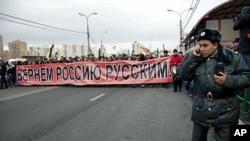Russia’s National Unity Day was celebrated Friday by nationalist groups who would like to break majority-Muslim regions away from Russia’s Christian geographic core.
About 7,000 Russian nationalists marched in Moscow, waving Czarist flags, and chanting such anti-immigrant slogans as “Migrants Today, Occupiers Tomorrow.”
With parliamentary elections only a month away, nationalism is a political force the Kremlin fears.
Nationalist happenings
Seeking to defuse nationalist anger against Muslim migrants from the Russian Caucuses region, a judge gave stiff jail sentences last week to six Muslim Russians convicted of participating in the murder last year of an ethnic Russian football fan.
On the other hand, a blogger published 1,000 pages of personal emails of Alexander Navalny, a new, charismatic leader of the nationalist movement. On the morning of the march, another leader was arrested at home and charged with promoting inter-ethnic discord.
For Friday’s parade, the nationalists were only allowed to march in a suburb far from Moscow’s center
Two police helicopters hovered overhead, filming marchers, mostly young men, many with bandannas covering their faces. Police stood shoulder to shoulder for almost one kilometer. Long lines of gray windowless steel trucks ready to take detainees to jail were parked in full view.
Police surveillance
One middle-aged couple said the police display of force intimidated them from joining the marchers.
Natalia said she lived nearby and came with her husband to support what she called the ‘boys.’ Like many onlookers, she did not want to give her name.
While the Kremlin likes to define nationalism as anti-Western, the protesters focused inward, denouncing the flow of workers to Moscow from Russia’s Muslim South and Central Asia.
Marchers chanted: “Free Russia, Russian Power.”
Potential for instability
Russia’s state-controlled television ignored the march. Vladimir Ryzhkov, an opposition politician, said the Kremlin flirted with using nationalism in the parliamentary election campaign, then backed away.
“We have Tatars, Bashkirs, Mordovs, Chuvash, Yakuts we have hundreds of ethnic groups inside Russia, and we have ethnic republics. And if Russian politicians use this idea that subject politics is ethnic group, Russia could explode. Because Russia is multicultural, multinational country.”
Ryzhkov, a historian, said nationalism tore apart the Russian Empire in the early 20th century, and led to the collapse of the Soviet Union in 1991.
“If Russian leadership, or serious politicians in Russia, use this ethnic Russian nationalism as an instrument, they will destroy Russia for a third time in one century,” said Ryzhkov.
For now, he said, Russia’s ruling politicians understand that the nationalist card is a far too dangerous one to play.
Russian Nationalists March Under Heavy Police Presence
- By James Brooke




